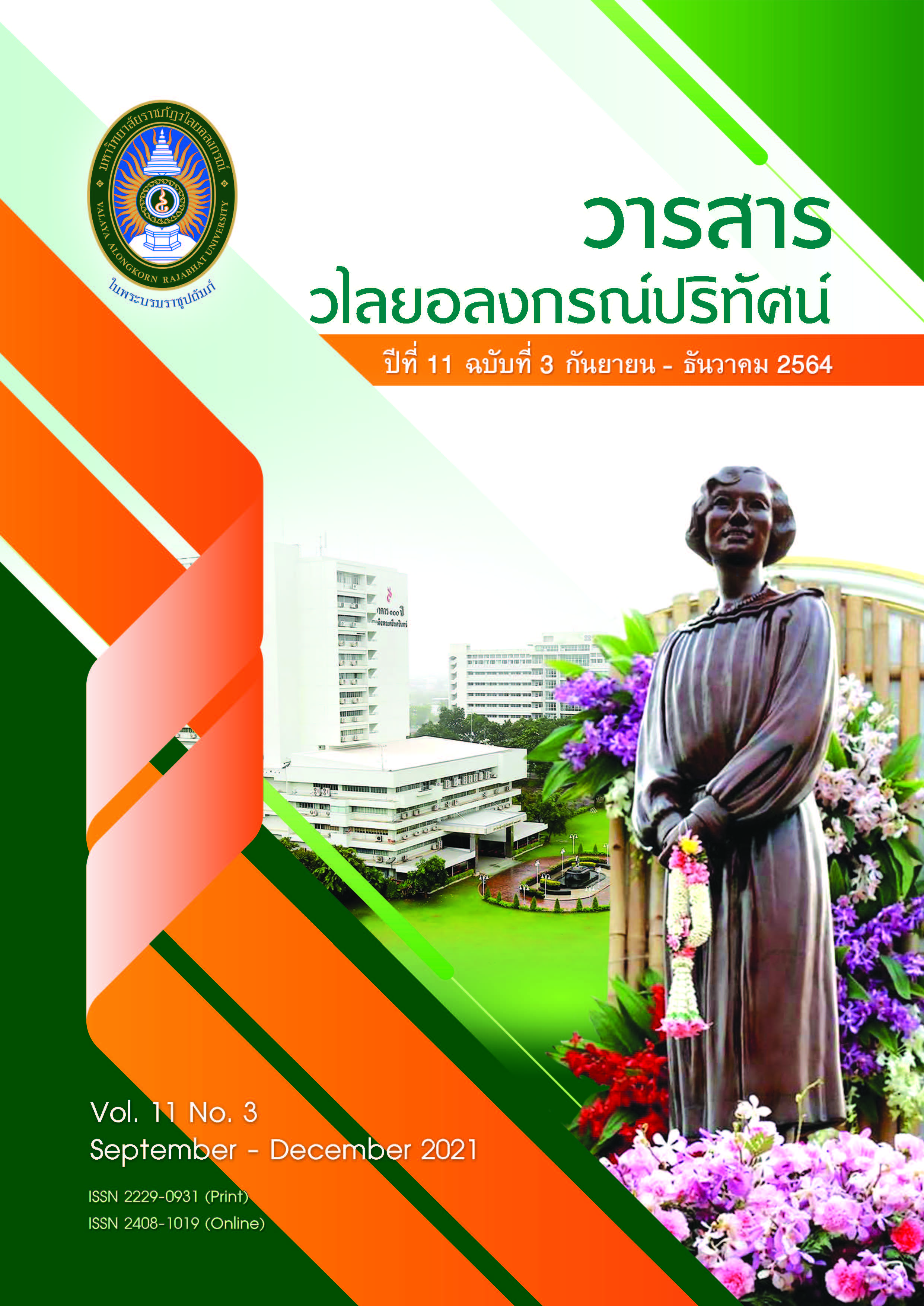กลยุทธ์การพัฒนาภาวะผู้นำทางวิชาการของหัวหน้ากลุ่มสาระการเรียนรู้ ในการจัดการเรียนรู้แบบสะเต็มศึกษา โครงการห้องเรียนพิเศษวิทยาศาสตร์ คณิตศาสตร์ เทคโนโลยีและสิ่งแวดล้อม
คำสำคัญ:
กลยุทธ์ภาวะผู้นำทางวิชาการ, หัวหน้ากลุ่มสาระการเรียนรู้, การจัดการเรียนรู้แบบสะเต็มศึกษาบทคัดย่อ
การวิจัยนี้มีวัตถุประสงค์เพื่อ 1) ศึกษาระดับสภาพปัจจุบันและสภาพที่พึงประสงค์ของภาวะผู้นำทางวิชาการของหัวหน้ากลุ่มสาระการเรียนรู้ ในการจัดการเรียนรู้แบบสะเต็มศึกษาโครงการห้องเรียนพิเศษวิทยาศาสตร์ คณิตศาสตร์ เทคโนโลยีและสิ่งแวดล้อม 2) พัฒนากลยุทธ์การพัฒนาภาวะผู้นำทางวิชาการของหัวหน้ากลุ่มสาระการเรียนรู้ ในการจัดการเรียนรู้แบบสะเต็มศึกษา โครงการห้องเรียนพิเศษวิทยาศาสตร์ คณิตศาสตร์ เทคโนโลยีและสิ่งแวดล้อม กลุ่มตัวอย่างประกอบด้วย หัวหน้ากลุ่มสาระการเรียนรู้ และครูผู้สอนกลุ่มสาระการเรียนรู้วิทยาศาสตร์และเทคโนโลยี และกลุ่มสาระการเรียนรู้คณิตศาสตร์ จำนวน 310 คน ผู้อำนวยการโรงเรียนหรือรองผู้อำนวยการโรงเรียน และครูผู้สอน จำนวน 12 คน เครื่องมือที่ใช้ในการเก็บรวบรวมข้อมูล คือแบบสอบถามและแบบสัมภาษณ์แบบมีโครงสร้าง วิเคราะห์ข้อมูลโดยคำนวณหาค่าเฉลี่ยส่วนเบี่ยงเบนมาตรฐาน วิเคราะห์คุณภาพ และวิเคราะห์กลยุทธ์การพัฒนาภาวะผู้นำทางวิชาการ ด้วยเทคนิค PNI modified
ผลการวิจัยพบว่า
1. ระดับสภาพปัจจุบันของภาวะผู้นำทางวิชาการของหัวหน้ากลุ่มสาระการเรียนรู้ในการจัดการเรียนรู้แบบสะเต็มศึกษา โครงการห้องเรียนพิเศษวิทยาศาสตร์ คณิตศาสตร์ เทคโนโลยีและสิ่งแวดล้อม อยู่ในระดับมากทุกด้าน เรียงลำดับจากมากไปหาน้อยดังนี้ (1) ด้านการส่งเสริมบรรยากาศทางวิชาการ ( = 4.32) (2) ด้านการนิเทศและประเมินการจัดการเรียนรู้ ( = 4.31) และด้านการจัดการเรียนรู้ ( = 4.31) (4) ด้านการกำกับ ติดตามความก้าวหน้าของนักเรียน ( = 4.30) (5) ด้านส่งเสริมการใช้นวัตกรรมเพื่อการจัดการเรียนรู้ ( = 4.17) (6) ด้านการวางแผน ( = 4.12) และ (7) ด้านการกำหนดพันธกิจของกลุ่มสาระ ( = 4.09)
ส่วนระดับสภาพที่พึงประสงค์ของภาวะผู้นำทางวิชาการของหัวหน้ากลุ่มสาระการเรียนรู้ ในการจัดการเรียนรู้แบบสะเต็มศึกษา โครงการห้องเรียนพิเศษวิทยาศาสตร์ คณิตศาสตร์ เทคโนโลยีและสิ่งแวดล้อม อยู่ในระดับมากที่สุดทุกด้าน เรียงลำดับจากมากไปหาน้อย ดังนี้ (1) ด้านการส่งเสริมบรรยากาศทางวิชาการ ( = 4.68) (2) ด้านการกำกับ ติดตามความก้าวหน้าของนักเรียน ( = 4.64) (3) ด้านการนิเทศและประเมินการจัดการเรียนรู้ ( = 4.59) (4) ด้านการวางแผน ( = 4.54) (5) ด้านการใช้นวัตกรรมเพื่อการจัดการเรียนรู้ ( = 4.51) (6) ด้านการจัดการเรียนรู้ ( = 4.50) และ(7) ด้านการกำหนดพันธกิจของกลุ่มสาระ ( = 4.42)
2. กลยุทธ์การพัฒนาภาวะผู้นำทางวิชาการของหัวหน้ากลุ่มสาระการเรียนรู้ ในการจัดการเรียนรู้แบบสะเต็มศึกษา โครงการห้องเรียนพิเศษวิทยาศาสตร์ คณิตศาสตร์ เทคโนโลยีและสิ่งแวดล้อม มีทั้งหมด 7 กลยุทธ์หลัก คือ (1) กลยุทธ์เสริมสร้างภาวะผู้นำในการวางแผน (2) กลยุทธ์เสริมสร้างภาวะผู้นำในการกำหนดพันธกิจของกลุ่มสาระ (3) กลยุทธ์ภาวะผู้นำในการใช้นวัตกรรม เพื่อการจัดการ (4) กลยุทธ์เสริมสร้างภาวะผู้นำในการกำกับ ติดตามความก้าวหน้าของนักเรียน (5) กลยุทธ์เสริมสร้างภาวะผู้นำในการส่งเสริมบรรยากาศทางวิชาการ (6) กลยุทธ์เสริมสร้างภาวะผู้นำในการนิเทศและประเมินการจัดการเรียนรู้ และ (7) กลยุทธ์เสริมสร้างภาวะผู้นำในการจัดการเรียนรู้
เอกสารอ้างอิง
กระทรวงศึกษาธิการ. (2562). ข่าววงการศึกษา : ขับเคลื่อนแผนบูรณาการด้านการศึกษา 6 ภาค. [ออนไลน์]. Available: https://www.moe.go.th/moe/th/news/. (2562, 28 กุมภาพันธ์).
ทวีศักดิ์ ยศถา. (2558). การพัฒนารูปแบบภาวะผู้นำการเรียนการสอนของหัวหน้ากลุ่มสาระ การเรียนรู้ ในโรงเรียนมัธยมศึกษา สังกัดสำนักงานเขตพื้นที่การศึกษามัธยมศึกษา เขต 11. หลักสูตรครุศาสตรดุษฎีบัณฑิต สาขาวิชาภาวะผู้นำการจัดการศึกษา มหาวิทยาลัยราชภัฏสุราษฎร์ธานี.
ปัณญานัตย์ วิเศษสมวงศ์. (2558). ส่วนอาเซียนสำนักการประชาสัมพันธ์ต่างประเทศจากบทความ. [ออนไลน์]. Available: http://www.aseanthai.net/special-news- detail.php?id=127. (2558, 26 กุมภาพันธ์).
เยาวเรศ จิตต์ตรง. (2556). กลยุทธ์การพัฒนาภาวะผู้นำด้านการเรียนการสอนสำหรับผู้บริหารโรงเรียน มัธยมศึกษา. วิทยานิพนธ์ปริญญาครุศาสตรดุษฎีบัณฑิต สาขาวิชาบริหารการศึกษา คณะครุศาสตร์ จุฬาลงกรณ์มหาวิทยาลัย.
วราภรณ์ สิงห์กวาง. (2561). รูปแบบการบริหารทีมงานของหัวหน้ากลุ่มสาระการเรียนรู้ในโรงเรียนมัธยมศึกษา. วิทยานิพนธ์ปริญญาการศึกษาดุษฎีบัณฑิต สาขาวิชาการบริหารการศึกษา บัณฑิตวิทยาลัย มหาวิทยาลัยนเรศวร.
วิจารณ์ พานิช. (2555). วิถีสร้างการเรียนรู้เพื่อศิษย์ในศตวรรษที่ 21. กรุงเทพฯ: มูลนิธิสดศรี-สฤษดิ์วงศ์.
วิชัย วงษ์ใหญ่. (2554). นวัตกรรมหลักสูตรและการเรียนรู้ สู่ความเป็นพลเมืองดี. กรุงเทพฯ: อาร์ แอนด์ ปริ๊นต์.
สถาบันส่งเสริมการสอนวิทยาศาสตร์และเทคโนโลยี. (2555). โครงสร้างหลักสูตรห้องเรียน พิเศษวิทยาศาสตร์มาตรฐานสากล ระดับมัธยมศึกษาตอนปลาย ตามแนวทางของสถาบัน ส่งเสริมการสอนวิทยาศาสตร์และเทคโนโลยี พุทธศักราช 2555 (ฉบับปรับปรุง). กรุงเทพฯ: องค์การค้าของ สกสค.
สถาบันส่งเสริมการสอนวิทยาศาสตร์และเทคโนโลยี. (2558). เอกสารกิจกรรมสะเต็มศึกษา ระดับชั้นมัธยมศึกษาปีที่ 4-6. กรุงเทพฯ: องค์การค้าของ สกสค.
สำนักงานเลขาธิการสภาการศึกษา. (2552). ข้อเสนอการปฏิรูปการศึกษาในทศวรรษที่สอง 2552-2561. กรุงเทพฯ: สำนักงานเลขาธิการสภาการศึกษา.
สำนักงานเลขาธิการสภาการศึกษา. (2560). แผนพัฒนาการศึกษาของกระทรวงศึกษาธิการ ฉบับที่ 12 (พ.ศ. 2560 - 2564). กรุงเทพฯ: พริกหวานกราฟฟิค.
Bossert, S. T. (1988). School effects. Handbook of research on educational administration. 341-352.
Hallinger, P., & Murphy, J. F. (1985). Assessing and developing principal instructional leadership. Educational leadership. 45(1): 54-61.
Hoy, A. W., & Hoy, W. K. (2003). Instructional Leadership: A learning-Centered Guide. Boston: Allyn and Bacon.
Krug, S. E. (1992). Instructional Leadership: A Constructivist Perspective. Educational Administration Quarterly. 28(3): 430-443.
ดาวน์โหลด
เผยแพร่แล้ว
รูปแบบการอ้างอิง
ฉบับ
ประเภทบทความ
สัญญาอนุญาต
ข้อความที่ปรากฏในบทความแต่ละเรื่องในวารสารวไลยอลงกรณ์ปริทัศน์ เป็นความคิดเห็นของผู้นิพนธ์แต่ละท่าน มิใช่เป็นทัศนะและมิใช่ความรับผิดชอบของกองบรรณาธิการจัดทำวารสาร และ
มหาวิทยาลัยราชภัฏวไลยอลงกรณ์ ในพระบรมราชูปถัมภ์


